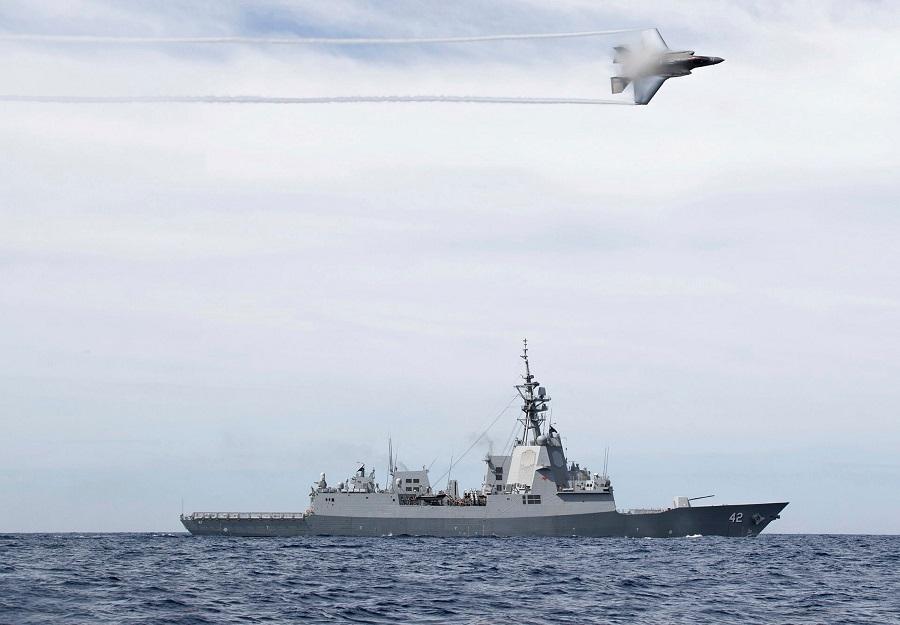
Sea state
The 2023 edition of Exercise Tasman Shield, held from 17 March to 3 April, brought together aircraft from the Royal Australian Air Force and ships from the Royal Australian Navy to practise integrated air–maritime missions and enhance the interoperability of sea and air forces. The F-35A Lightning IIs, F/A-18F Super Hornets, EA-18G Growlers, E-7A Wedgetails, P-8A Poseidons, KC-30A tankers and Hawk 127 lead-in fighters tested their ability to work together and with air warfare destroyers HMAS Hobart and HMAS Sydney. Commodore Paul O’Grady noted that the exercise progressed the RAN’s ability to provide aid defence at sea.
The US has sent the submarine USS Florida, capable of carrying more than 150 Tomahawk cruise missiles, into the Red Sea in a show of force in response to attacks on American personnel by Iran-backed groups across the Middle East. The move is part of the broader US effort to increase its military presence in the region amid significant regional developments including rising tensions between Iran and Israel, a thaw in relations between Iran and Saudi Arabia, and the expanding Russian and Chinese footprint in the region.
Flight path
Israel has conducted air strikes against infrastructure it says is controlled by the Palestinian militant group Hamas in Lebanon and the Gaza Strip. The strikes were a response to rockets being fired into Israel from southern Lebanon and the Gaza Strip. Most were intercepted by Israel’s Iron Dome defence system. The strikes and counterstrikes intensified after Israeli police raids on the al-Aqsa mosque in Jerusalem on the eve of Ramadan and Passover. Against the backdrop of escalating tensions with Tehran, Israel is reportedly investigating Iran’s involvement in the rocket attacks from Lebanon.
China has simulated precision strikes against Taiwan in an operation it’s calling ‘Joint Sword’. Beijing has described the drills as a ‘stern warning’ to Taiwan following its president’s visit to the US. Taiwan reported that up to 70 Chinese aircraft and 11 Chinese ships encircled the island and conducted simulated attacks on aircraft carrier groups as well as anti-submarine drills. More than 40 Chinese warplanes either crossed the Taiwan Strait median line or entered Taiwan’s air defence identification zone. The drills attracted strong condemnation from Taiwan and are being closely watched by the US, which simultaneously conducted a freedom-of-navigation operation in South China Sea waters claimed by China.
Rapid fire
The Australian Army’s 2nd/14th Light Horse Regiment (Queensland Mounted Infantry) tested the Boxer combat reconnaissance vehicle at last month’s Exercise Damascus. The live-fire and tactical training is intended to prepare the unit for exercises including Talisman Sabre later this year. The Boxer, being delivered by Rheinmetall Defence Australia, will replace the aging ASLAV light armoured vehicle.
Meanwhile, the army’s MRH-90 Taipan helicopter fleet has returned to normal flying operations. The fleet was grounded after an engine failure in March led to a Taipan crashing into Jervis Bay. The accident, which left two Australian Defence Force members with minor injuries, followed a series of groundings and other problems in the helicopter fleet since its acquisition in the mid-2000s.
Final frontier
Lockheed Martin Australia has been selected to build the Australian Defence Force’s next-generation satellite communications system. While a procurement contract is yet to be issued, the announcement means the company has moved to the next phase of negotiations with the government under Joint Project 9102, which aims to provide a sovereign-controlled satellite communication system over the Indo-Pacific ocean region.
Raytheon Australia has launched a program supporting the training of defence space industry workers in Exmouth, Western Australia. The program is designed to keep world-class talent in Exmouth as the strategic naval and space capabilities at the Harold E. Holt precinct become increasingly important. A pipeline of space careers in the region has been created since the relocation from New Mexico of the US-owned space surveillance telescope, which is operated by Australia and used to track debris in space.
Wired watchtower
Hackers from the Russian government and its affiliates are increasingly attacking Ukraine’s information technology systems as part of the war launched by Vladimir Putin. Targets include closed-circuit cameras that public and private entities installed for their own security. The hackers have gained access to webcams, including some mounted in coffee shops, to track the movement of convoys and trains delivering humanitarian aid. Russian operatives have also targeted US defence manufacturers and transport firms to acquire information on the arms supply chain supporting Ukraine.
Israeli agencies holding vital data on the country’s airlines, transport organisations, and postal and irrigation systems are grappling with a surge of cyberattacks. A recent incident resulted in water monitors malfunctioning and scheduled watering being suspended, directly impacting agricultural production. Hacktivist group GhostSec, known for its pro-Palestinian stance, claimed responsibility and said it had infiltrated Israel’s satellite system and water pumps, although its involvement is yet to be verified. Israel’s National Cyber Organisation has warned of impending attacks on Israeli infrastructure during the month Ramadan and in the lead-up to ‘Iranian Jerusalem Day’ on 14 April.